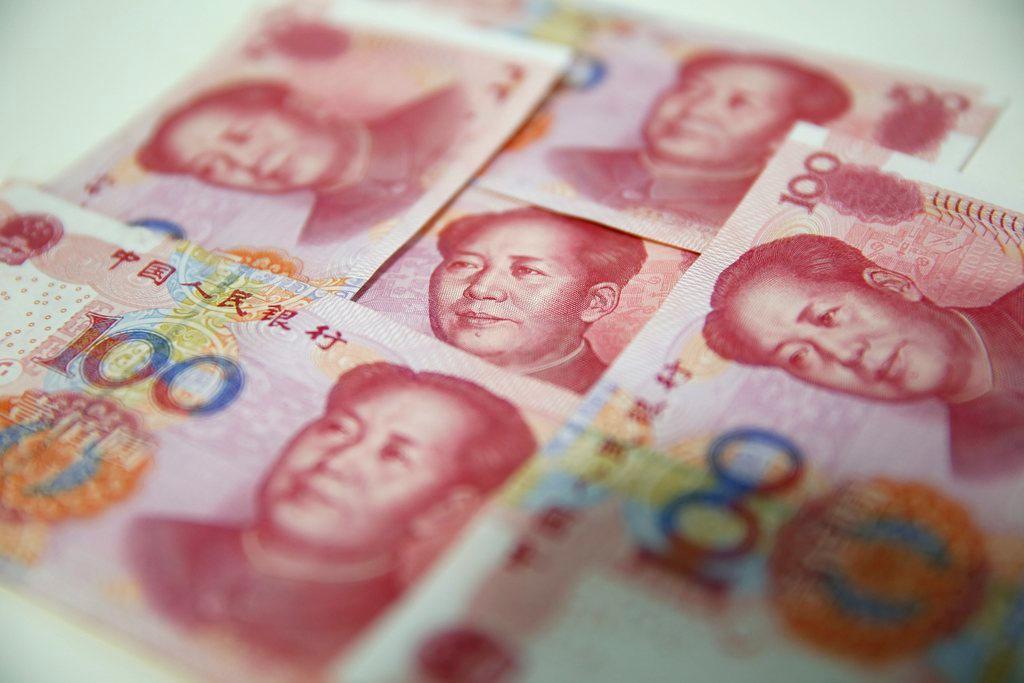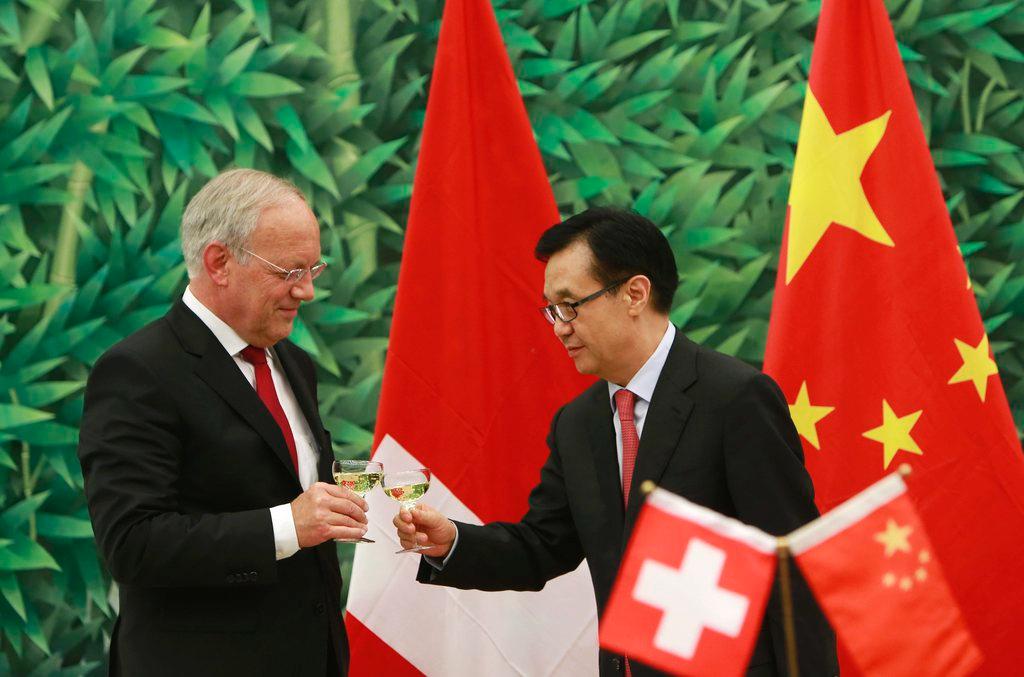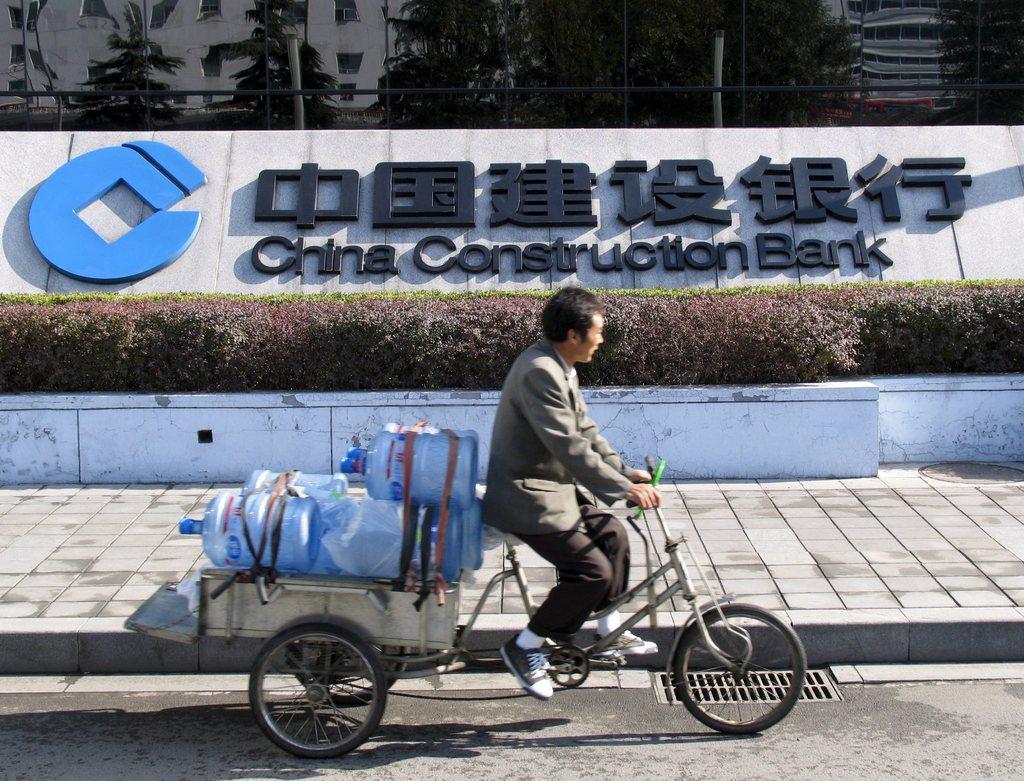Expectations high for future Swiss renminbi trading hub

All eyes are on Switzerland’s future renminbi trading hub, which has ‘huge potential’, say observers. The China Construction Bank (CCB), the first Chinese bank to receive a licence to offer commercial banking services and clear renminbi transactions in Switzerland, is building a team in Zurich to become operational.
CCB’s recently installed director David Gong told swissinfo.ch on Friday that preparations were ‘on track’ in Zurich and that the bank should be operational in the ‘coming weeks’.
The CCB received a licence two weeks ago from the Swiss banking regulator FINMA. The arrival of the Chinese bank is expected to complete the jigsaw for Switzerland to become a fully-fledged renminbi trading hub.
“The bank has received the authorisation by FINMA to open a bank branch, but it has to undertake some preparatory work before being able to enter its brand in the commercial register of Switzerland and before it can start operating,” said FINMA spokesperson Tobias Lux. “This is nothing extraordinary in an authorization process.”
The Chinese bank already has a branch office at Beethovenstrasse 33 in Zurich and currently employs 17 staff members, a number that should rise to 25 in the next few weeks and to 50 in 2016, according to the Internet news site Finnews.ch. Holger Demuth joined as chief operating officer (COO) from Clariden Leu bank in September.
“We are working hard for Switzerland to become a renminbi clearing hub, servicing Chinese and local customers in Switzerland. Our plan is to offer traditional commercial banking facilities such as deposits, syndicated loans and finance for corporate customers,” Gong told trade finance experts at a conference at the Geneva Graduate Institute on Friday.
Global network
The Chinese authorities have aggressively promoted international use of the renminbi since 2010, creating a global network of offshore banks to promote the renminbi as a reserve currency.
CCB has branches in 24 countries, in cities such as London, Tokyo and New York, and this year started operations in Paris, Amsterdam, Barcelona and Milan, offering major Chinese firms and local companies corporate banking services similar to those planned in Zurich.
“Our long-term goal is to devote efforts to renminbi globalisation and renminbi offshore market set-up in Switzerland. We also want to further promote bilateral finance and trade between China and Switzerland,” said Gong.
According to Swift, the payment services provider, China’s renminbi accounted for 2.79% of global payments in value terms in August, overtaking the Japanese yen to become the world’s fourth-most-used payment currency behind the US dollar, the Euro and UK Sterling.
The rise of the renminbi comes despite financial turmoil in China in recent months. The central bank unexpectedly devalued the renminbi in August, part of an effort to slow capital outflows. The economy is also on course for its slowest annual growth in a quarter of a century.
Potential
Despite this downturn, China’s ambassador to Switzerland Xu Jinghu said the arrival of the CCB and Sino-Swiss financial cooperation in general offered “enormous potential”.
“Using renminbi, companies will be able to reduce business risks linked to exchange rates, and to lower investment costs,” the ambassador told the Geneva conference, adding that other Chinese banks were keen to join CCB in Zurich.
“Chinese-Swiss financial perspectives are extremely promising,” she said.
She also highlighted the case of insurer Swiss Re, which in June this year became the first Swiss company to be granted a Renminbi Qualified Foreign Institutional Investor (RQFII) licence. This will allow it to use offshore yuan stored with bank HSBC to buy stocks and bonds in mainland China.
Guy Barras, head of trade finance at Credit Suisse, said the idea of having a Chinese bank presence in Switzerland was very important “culturally but also in terms of building bridges in commodity trade financing”.
Wang Min, a senior global trade manager at the Bank of China, gave the Geneva conference some figures to underline the business prospects.
“One-quarter of Chinese imports are commodities, worth $500 billion, while trade between China and Switzerland is worth $15 billion. So the potential to further expand commodity trade is vast. This is why the Bank of China is keen to emphasise developing Geneva commodities trading. The most famous companies are well established here. They know how to deal with risk management and structure deals, and can help promote commodities trading. It’s an ideal place to carry out business,” he said.
Top listing
The Financial Stability Board, which coordinates financial regulation worldwide, said on November 3 it had added China Construction Bank to its list of global, systemically important banks who must hold extra capital due to their significance.
It said it had removed Spain’s BBVA from its list of about 30 top global banks, known as “G-SIBs”. The FSB updates the list annually, to reflect the size, interconnectedness and complexity of major banks.
End of controls
Blaise Godet, president of the Swiss-Chinese Chamber of Commerce and former Swiss ambassador to China, welcomed the arrival of the CCB, which he said would contribute to the internationalisation of the renminbi.
“Also, in terms of wealth management and corporate finance it strengthens the Swiss financial sector,” he noted. “Today, 88% of global transactions are in dollars, so it’s clear that if the renminbi becomes convertible and given China’s weight in international trade exchanges, I think we can talk about it being a game-changer.”
The key to international acceptance of the renminbi as a freely tradeable global currency – and ultimately acceptance by the International Monetary Fund (IMF) as a reserve currency – is for China to end its policy of strictly controlling the amount of money that can leave the country.
Last year the Swiss National Bank (SNB) External linksigned a deal with its Chinese counterpart to allow for currency swaps between the two countries. But the SNB-China central bank swap deal only allows currency swaps to the value of RMB50 billion (CHF7.57 billion or $7.8 billion). The lifting of capital controls is essential for investors to fully tap into the potential gold mine of renminbi currency trades. So far, the Chinese government has only made small gradual changes.
Franco Morra, the president of the Association of Foreign Banks in Switzerland, said he expected no changes to currency limits before 2017, but once this happens “things could go faster”.
During her visit to China in February 2015, outgoing Finance Minister Eveline Widmer-Schlumpf raised the question of Swiss bank branches in China being allowed full banking licences. At present, foreign banks operating in mainland China are only allowed to conduct limited business lines. However, the finance ministry reported that there was no concrete solution to this question and a timetable had not been set for thrashing out the issue.
“It remains a very protected, closed, opaque market. I can only encourage the Swiss authorities to continue discussions to liberalise and open up the Chinese market, whether it be finance, banking or insurance,” said Godet.
The Swiss free trade agreement (FTA) with China, signed in 2013, came into force on July 1, 2014. The Swiss economics ministry said the deal was the most important free trade agreement for Switzerland’s export industry since the 1972 accord with the European Union.
China is the third most important trade partner for Switzerland after the EU and the US.
Between July 1, 2014, and May 2015, Swiss exports to China increased 3% whilst goods arriving in Switzerland from the opposite direction have seen an increase of 4.2%. This outstripped the 0.4% growth of Swiss exports worldwide, according to the State Secretariat for Economic Affairs (SECO).
The Swiss machinery, precision instruments, pharmaceutical, chemical and watchmaking sectors are those expected to gain most from eventual tariff decreases resulting from the FTA.

In compliance with the JTI standards
More: SWI swissinfo.ch certified by the Journalism Trust Initiative




You can find an overview of ongoing debates with our journalists here. Please join us!
If you want to start a conversation about a topic raised in this article or want to report factual errors, email us at english@swissinfo.ch.